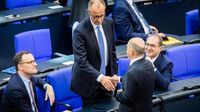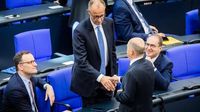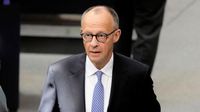In a significant political turnaround, Friedrich Merz, the leader of the Christian Democratic Union (CDU), was elected as the tenth Chancellor of Germany on May 6, 2025, during a second round of voting in the Bundestag. Merz secured 325 votes, surpassing the required absolute majority of 316 votes, after a historic failure in the first ballot where he received only 310 votes.
The election process began earlier in the day when Merz's bid for the chancellorship fell short, marking a first in German history where a designated chancellor failed to gain the necessary majority in the initial round. This prompted hours of negotiations among the coalition parties, including the SPD, Greens, and Left, leading to a decision to hold a second ballot on the same day.
Following his successful election, President Frank-Walter Steinmeier officially appointed Merz at his residence, Schloss Bellevue. The appointment was a critical moment for Merz, who now faces the immediate challenge of forming a stable government amid rising political tensions and economic uncertainties in Germany.
"I assume that now in the second ballot the necessary majority is there, so that Friedrich Merz is the next Chancellor of our country," stated SPD chief Lars Klingbeil, expressing optimism about the outcome of the second vote.
Merz's election comes at a time when Germany is grappling with various pressing issues, including migration and energy prices. Reiner Haseloff, the Minister President of Saxony-Anhalt, congratulated Merz, emphasizing the expectation for the new government to address these challenges effectively.
In the hours leading up to the second vote, Jens Spahn, the new leader of the Union faction, rallied support for Merz, stating, "The whole of Europe, perhaps the whole world, is watching this vote." His comments underscored the significance of the election not just for Germany, but for European stability as well.
Despite the earlier setback, many in the coalition expressed confidence that Merz would secure the necessary support in the second round. The CDU/CSU and SPD coalition holds 328 seats in the Bundestag, making the path to a majority feasible, albeit uncertain given the earlier defections.
Critics, including Bodo Ramelow of the Left Party, pointed fingers at the CDU and SPD leadership for their failure to prepare adequately for the first round, leading to what he termed as a "burden for our democracy." Ramelow's comments reflect the broader concerns regarding political stability in Germany, particularly in light of rising extremism and public dissatisfaction.
After the first ballot, Merz was urged to regroup and consolidate support among his coalition partners. The urgency of establishing a functioning government was echoed by various political leaders, including CSU leader Markus Söder, who called for unity and responsibility among lawmakers.
Despite the challenges, Merz's supporters remained hopeful. "It's a wake-up call for Merz," said Mathias Middelberg, a CDU member, suggesting that the missing votes in the first round were a reflection of internal party dynamics rather than outright opposition to Merz himself.
As the day progressed, the Bundestag approved a motion to shorten the timeline for the second ballot, allowing for a quick resolution to the leadership impasse. This decision was crucial, as it demonstrated a commitment from the coalition parties to work together despite the earlier divisions.
With the second vote concluded and the results announced, Merz expressed gratitude for the trust placed in him. He now faces the task of not only leading the government but also healing the rifts that surfaced during the tumultuous election process.
As he prepares to take office, Merz's cabinet will be sworn in later in the day, marking a new chapter in German politics. The appointment of 17 federal ministers is set to follow, with significant expectations resting on their shoulders to deliver on pressing national issues.
In the wake of his election, international leaders, including EU Commission President Ursula von der Leyen and Ukrainian President Volodymyr Zelensky, extended their congratulations, highlighting the importance of cooperation in addressing shared challenges.
Moving forward, the new government under Merz will need to focus on fostering stability and addressing the concerns of a divided electorate, as the political landscape in Germany remains precarious.
The events of May 6, 2025, will undoubtedly be remembered as a pivotal moment in German political history, illustrating both the challenges and the resilience of its democratic institutions.






